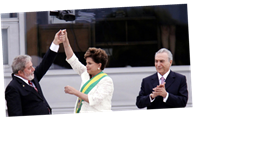Petra Costa’s second feature documentary, “The Edge of Democracy,” tells the story of the rise of democracy following years of military dictatorship in Brazil — and the corruption threatening its very existence. Costa’s story is personal, too, as she chronicles her own coming of age alongside her country’s democracy.
Costa’s parents were revolutionaries who fought against the dictatorship, but other family members benefited from the system of bribes and corruption that have been in place for decades.
“I really had the feeling that I was reaping the fruits of their struggle, of their lifetime work. And that gave me the freedom to do films that are more psychological, more [intimate], more poetic because I felt that work of guaranteeing democracy and fighting against social inequality was done and I took it for granted,” she explained following a screening of the film at the International Documentary Association’s annual screening series in Los Angeles. “I take responsibility for that today because it’s never done. And I think many of us felt too early that we didn’t need to certify that democracy was thriving and surviving and that our role was to just vote once every four years. I think it’s not enough.”
Costa, whose previous feature, “Elena,” told another very personal story about her older sister, worked on “The Edge of Democracy” for three years. After plenty of persistence, she gained intimate access to former (and then current) Presidents Luiz Inácio Lula da Silva and Dilma Rousseff, plus many other high-ranking officials.
Popular on IndieWire
“It took a long time to get the access that you see in the film. We first got into the Congress and then every politician I met, if they knew Dilma would ask them to introduce me to her or to other politicians that I wanted to meet,” she said. “It was very hard, because she was in the middle of the impeachment process. So we would never get an answer, until I sneaked into a bus full of historians that were going to visit her. And that’s when I managed to speak with her for the first time and I gave her a DVD of my previous film and asked for an interview and months later we got the interview, but a very formal interview. It’s not what you see in the film. It didn’t even make it to the film because it was very formal and she was very closed off. And it would take a year for me to get that access that you see in the film where I feel it’s actually her because that’s what we wanted in the film — to feel like we were really with the characters in the moment where they were going through what they were going through … not their analysis about the situation in a closed and cold way.”
Rousseff was removed from office after an impeachment process that has been criticized (and Costa presents in the film) as fraudulent, leading to the rise of far-right current President Jair Bolsonaro. There are many parallels to present-day American politics in the film, although there are obvious differences between the two impeachment cases.
“I think there are many reasons for [the parallels]. One of them is that part of the right has seen that their voting base is disappearing, that there are more and more women, people of color, that are voting and voting progressively, and so they decided — and this was a conscious decision — to not play by the rules of the game anymore, and that they could win faster and stay in power longer by not playing by the rules of the game,” Costa said. “In Brazil, that was particularly the case, because the Workers Party had won four times in a row and would probably win again, and they decided to make the impeachment even though there were no legal grounds for that impeachment. And here something very similar has been happening since the ’70s. According to these writers who I like called Steven Levitsky and Daniel Ziblatt, who wrote ‘How Democracies Die,’ increasingly a part of the Republican party has not been respecting the rules of the game, and there’s also the huge influence of money in democracy that is asphyxiating democracy and is not being regulated.”
Although the situation in Brazil is tenuous, Costa said she does feel a sense of hope that young people in her country will feel the urgency to preserve their democracy.
“I feel now more and more young people understand that democracy is at risk and depends on their actions. So there have been protests with more and more young people in Brazil and I hope that leadership will continue to rise,” Costa said. “I feel hopeful, but it’s a tentative hopefulness where it’s like we really didn’t get it completely yet, the urgency of all this, its urgency in terms of the climate crisis and of democracy and we’re on the verge of collapse. So we can’t just be hopeful, we need to rise [up].”
“The Edge of Democracy” is available to stream on Netflix.
The IDA Documentary Screening Series brings some of the year’s most acclaimed documentary films to the IDA community and members of industry guilds and organizations. Films selected for the Series receive exclusive access to an audience of tastemakers and doc lovers during the important Awards campaigning season from September through November. For more information about the series, and a complete schedule, visit IDA.
Source: Read Full Article
